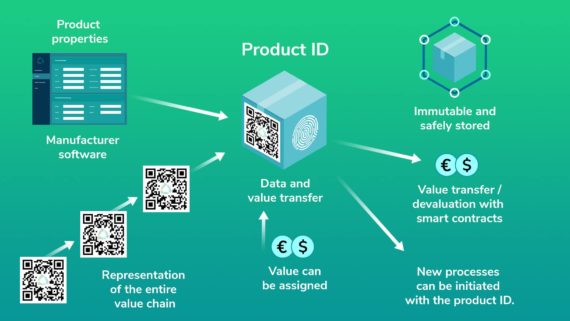Sustainability with the help of new technologies
The BIOTA association develops a digital product ID solution that can support companies and municipalities in achieving their sustainability and decarbonization goals as well as proof of origin.
Many industrial companies as well as cities are currently facing a number of major challenges. In addition to overcoming the economic and social damage caused by the corona pandemic, many are facing the task of sustainable resource management and the challenges posed by decarbonization. The German based BIOTA association is developing a Product ID solution based on a Distributed Ledger Technology of the latest generation. This will support companies and municipalities in the field of recycling management, in achieving their sustainability and decarbonization goals, and in tracking product characteristics across the entire value chain. The BIOTA association also makes use of the positive characteristics of this technology and develops a deposit system for certain basic materials, e.g. plastics or rare materials.
The challenges resulting from the goals of decarbonization and recycling management are immense for many companies and local authorities, especially because they are faced with constant changes in national and international legislation. For example, the expenses of the climate package are to be financed by the introduction of a new CO2 and plastics tax, among other things. Demands for more extensive digitization have also been growing louder for years. But the industry of the future is much more than just digital. It is connected in effective systems across national borders and is developing a whole new way of dealing with resources, energy and economic relations. Cities are also evolving and becoming so-called “smart cities”, with holistic development concepts aimed at making communities more efficient, technologically advanced, greener and more socially inclusive. BIOTA is currently developing solutions that can support companies and cities in meeting these major challenges.
Product ID on Distributed Ledger Technology
A solution developed by the association is a Product ID based on a Distributed Ledger Technology (DLT) of the latest generation, which simultaneously combines a secure and decentralized data transfer with a financial transfer without transaction costs.

This enables companies and local authorities to handle the most diverse tasks efficiently and transparently, i.e. also verifiably. There are many examples of this:
- Proof of origin: traceability back to the raw material (a payment transaction can play an important role in the future).
- Product Carbon Footprint: Balance of greenhouse gas emissions along the entire life cycle of a product (CO2 costs can be mapped simultaneously with this system).
- Deposit systems: BIOTA e.V. is developing a deposit system which can both sort and pay out deposits based on the product ID.
- Waste management systems: Waste disposal according to demand and technology-supported optimization of disposal routes. A reduction of the sorting costs.
All of this works with a DLT, which uses a cryptological procedure for encryption. The trick here is that new product IDs are only considered verified when they have been checked by all participants in the network. Only then is an entry made in the Distributed Ledger, i.e. a kind of authentication is performed. All this happens at an enormous speed. Each transaction is thus provided with a signature. This means that a mathematical puzzle has to be solved which serves to sign the product ID and thus make it tamper-proof. Using this procedure, the Product ID can be securely extended along the entire value chain with the help of special software. So-called “Smart Contracts” are used to assign a value to the Product ID that is just as securely stored decentrally as the information itself. This value can in turn be extended or invalidated using a specific procedure.
With this new procedure, the current limits of block chain technology can be exceeded. The system under development by BIOTA can combine the following advantages:
- Decentralization: Every participant has the same rights. There is no central instance. Therefore the system has the typical characteristics of an “open standard”.
- Unique Product ID: With a unique product ID based on a QR code (other codes are also possible), the properties can be tracked in an authority-safe way. The data can be stored securely along the entire value chain. For example, the carbon footprint of a product or other proofs of origin can be displayed unalterably.
- Payment transfer: A financial transfer is possible in parallel to the data transfer. A special feature is that the technology used is not based on energy-intensive mining, unlike block chain technology. Therefore no transaction costs are incurred, which is a basic requirement for micro payments. In the future this feature may play a prominent role, as the “Internet of Things” grows, in the increasing machine-to-machine interaction and in smart cities.
- Manufacturer software: The unique product ID is created using software that enables speeds on an industrial scale.
BIOTA uses and combines these advantages in the development of the deposit system Deposy e.g. for plastic waste and rare materials, with the aim to solve at least part of the plastic waste problem.
The BIOTA association offers companies from the industry and trade as well as local authorities the opportunity for cooperation with regard to this innovative product ID and the deposit system Deposy.